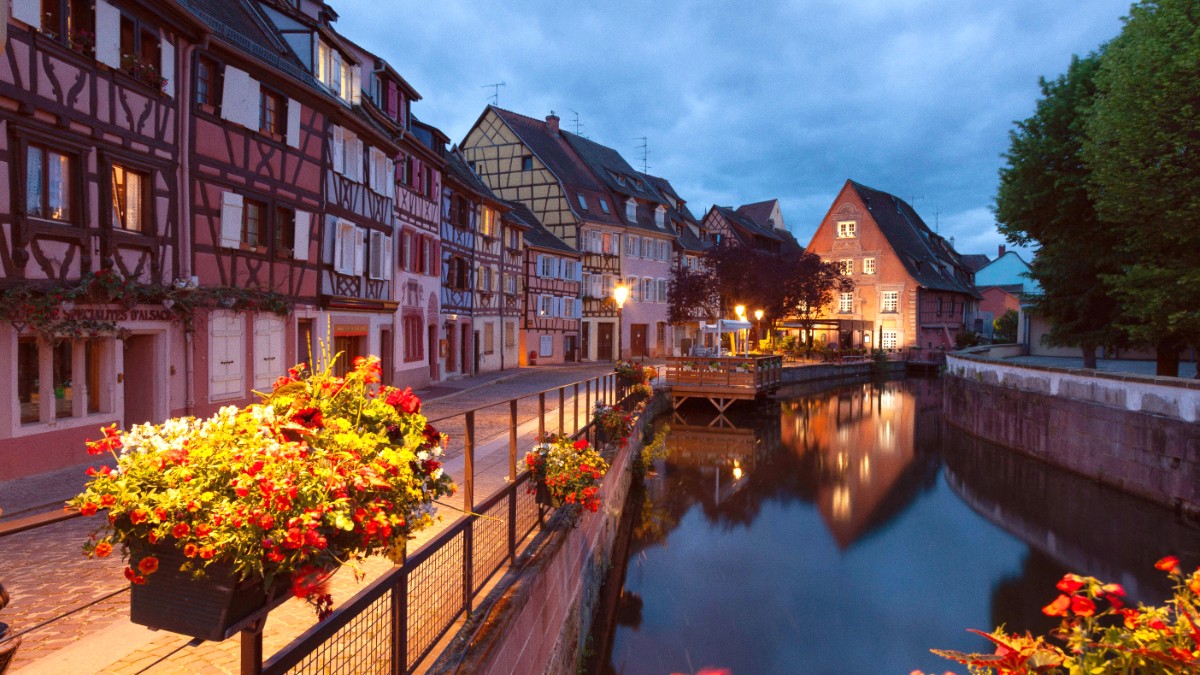
France
Colmar benefits from an unique microclimate, shielded by the Vosges Mountains from western winds and rainfall.
Spring (April-May) brings mild temperatures, typically 10-18°C (50-64°F), with fresh air and blooming nature. Summer (June-August) sees warm to hot temperatures, 18-28°C (64-82°F), with abundant sunshine. Autumn (September-October) remains mild, 10-20°C (50-68°F), with crisp air. Winter (November-March) has significant temperature drops, 0-7°C (32-45°F), and common snowfall.
Colmar has distinct high, shoulder, and low seasons, each with its own advantages and disadvantages for visitors.
Summer (July-August) and the Christmas Market Season (late November-December) are high seasons. They feature the warmest weather or a magical festive atmosphere, but also large crowds and peak prices. Shoulder seasons (April-June, September-October) offer pleasant weather, fewer crowds, and better value. Low season (January-March, early November) has the fewest crowds and lowest prices, though the weather is cold and daylight hours are short.
July-August & Christmas Markets
Warmest weather / magical festive atmosphere, all attractions open, long daylight.
Large crowds, highest prices for accommodation and flights, advance booking needed.
April-June & September-October
Pleasant weather, fewer crowds, better value prices, beautiful vineyards.
Some smaller attractions may have reduced hours, increased possibility of rain.
January-March & Early November
Fewest crowds, lowest prices, authentic local experience, snowy landscapes.
Cold weather, limited outdoor activities, short daylight hours, quieter atmosphere.
Colmar's microclimate means lower precipitation. Winters can see significant snowfall, requiring footwear with good grip. Summers can have brief heatwaves, making hydration and shade important. Carry a Reusable water bottle.
Wine tasting is ideal in September/October (harvest) or April/May (blooming vineyards). Hiking and cycling are best in May-June and September-October for mild temperatures and scenic views. Christmas markets are a must from late November through December, despite crowds and cold. General sightseeing is excellent in May-June and September-October.
A Light jacket or Umbrella for shoulder seasons.
Waterproof boots with good grip for snow and ice.
Sunscreen and hats for summer heat.
Especially for high season and Christmas market visits.
Carry a Reusable water bottle during warm months.
Travel costs vary significantly based on your spending preferences, from budget-conscious to luxury. The Euro (€) is the official currency.
Approximate daily expenses based on travel style.
General prices for common services.
Awareness and preparation reduce travel discomfort.
A comprehensive approach to safety includes knowing emergency contacts and securing appropriate travel insurance.
While Colmar is generally safe from major natural disasters, awareness of seasonal conditions is wise. The Lauch River can have high water levels during heavy rainfall, but significant flooding in the city center is rare due to protective measures.
Summers can experience heatwaves, making sun protection and hydration important. Winters bring snow and ice, meaning slippery surfaces. Wear appropriate footwear with good grip.
Comprehensive travel insurance is strongly advised for all travelers. It protects against unforeseen circumstances disrupting your trip or causing financial hardship.
Covers medical emergencies, trip cancellations, baggage loss.
Check policy for exclusions and pre-existing conditions.
Know the emergency numbers for France and your personal contacts. Program them into your phone and keep a physical copy.
Universal European Emergency: 112. Police: 17. Fire: 18. Medical: 15.
Report lost/stolen cards and passports immediately.
France has excellent healthcare. Pharmacies are a good first stop for minor issues and advice. EU citizens use EHIC.
Consult your doctor 4-6 weeks before for vaccine advice.
No specific health entries for common travelers at present.
| Category | Resource | Description |
|---|---|---|
| Water Filtration | LifeStraw | Consumer water filtration products. |
| First Aid Supplies | Adventure Medical Kits | First aid supplies for travelers. |
| Anti-Theft Gear | Pacsafe | Anti-theft bags and travel security products. |